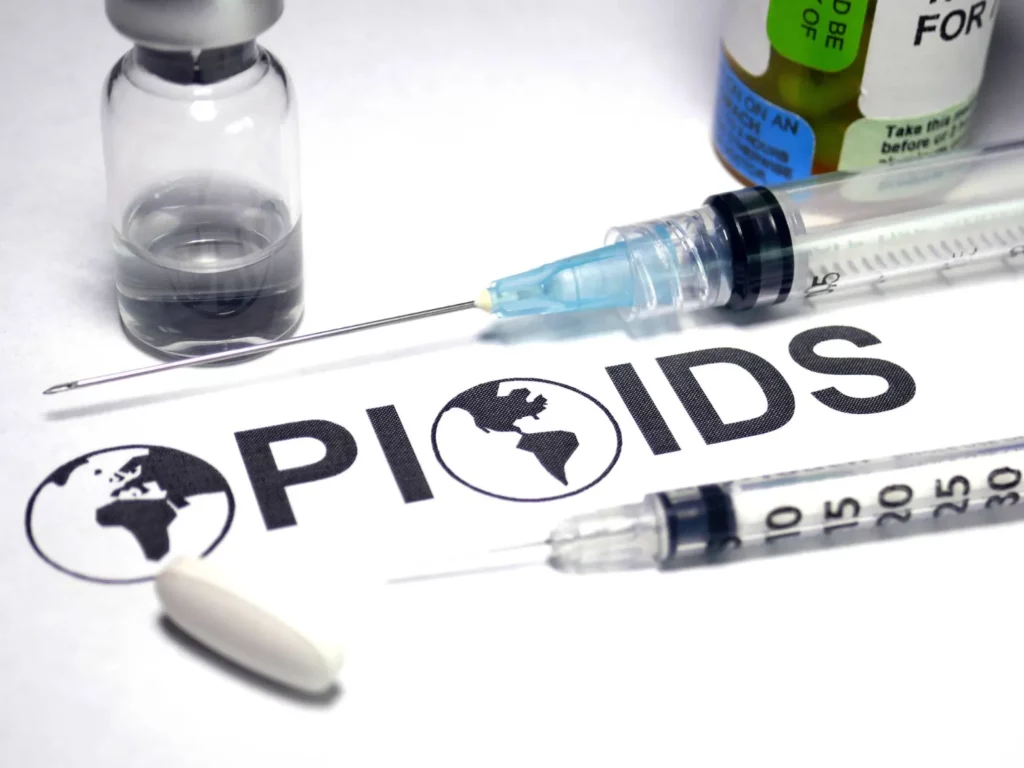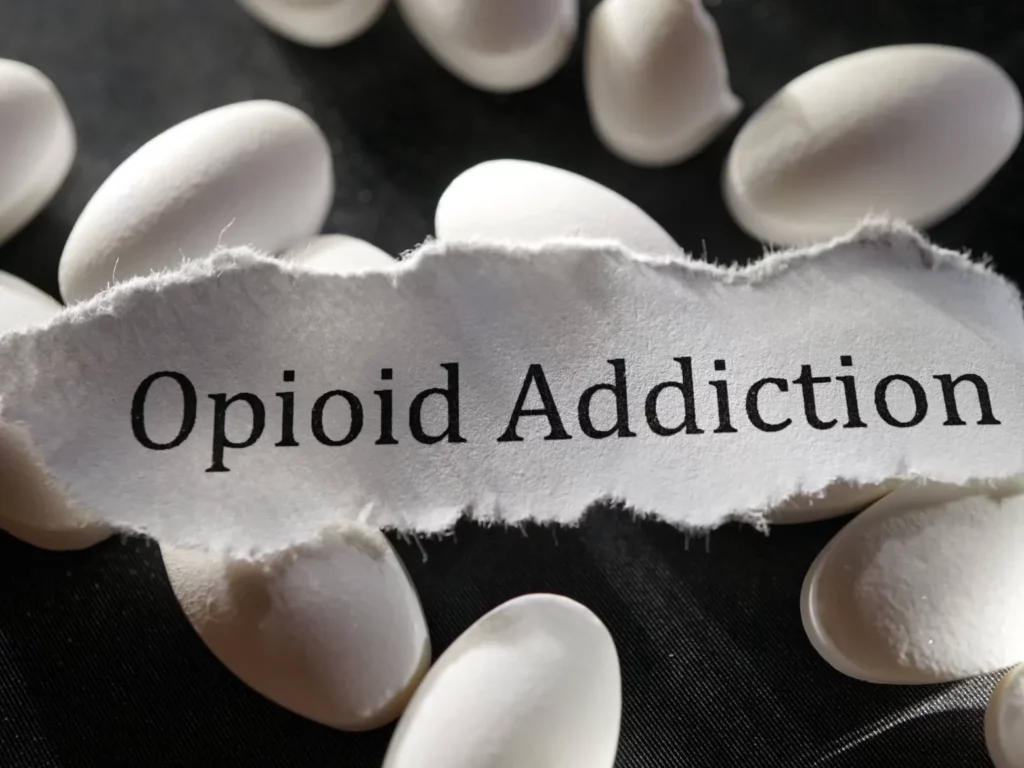Opioid Addiction and Treating the Crisis
Pacific Interventions is dedicated to the treatment of opioid addiction with compassion and evidence-based practices. Our staff understands the complexity of this crisis, and their efforts will ensure that patients have what they need to defeat their addiction.
We highly recommend early intervention and strongly encourage anyone seeking help to do so as soon as possible.

What is Opioid Addiction?
Opioid Addiction, also known as Opioid Use Disorder (OUD), is a complex illness characterized by compulsive use of opioid drugs even when the person wants to stop or when using the drugs negatively affects the person’s physical and emotional well-being.
When people think about opioid problems or addictions, they often picture street drugs like heroin or fentanyl. However, issues can also arise from misusing prescribed opioids like oxycodone, morphine, or codeine or taking opioids that were not prescribed to you.
Opioids are strong drugs usually given to treat severe pain. While they can create feelings of intense pleasure when abused, they also pose a risk of fatal overdose. When used correctly, opioids are effective medications, but their powerful effects can lead to addiction.
Signs and Symptoms of Opioid Addiction
Physical Dependence
This happens when a person uses opioids, and their body adapts to the drug. If they stop using it, they may feel withdrawal symptoms like cravings and sweating.
Increased Use
A person with OUD continues to use opioids despite facing health, safety, financial, or relationship issues. They cannot control their opioid use, and their actions to get and use opioids disrupt their daily life.
Cravings
These are intense physical and emotional urges to use the drug, even when the person knows it could harm them.
Other Signs
- Drowsiness
- Changes in sleep patterns
- Weight loss
- Frequent flu-like symptoms
- Low sex drive
- Poor hygiene
- Changes in exercise habits
- Isolation from family and friends
- Stealing from others
- New financial problems
Take the First Step Towards Recovery
The Dangers of Opioid Addiction
Opioid addiction is a major public health problem, affecting people, families, and society at large. Heroin is included along with prescription pain relievers and synthetic opioids like fentanyl. The most serious risk involved is overdose, leading to respiratory depression.
Other possible long-term effects include cardiovascular problems, liver damage, infections, and neurological disorders. Other probable manifestations of opioid use disorder are family breakdown, economic dependency, loss of work, and crime.
Addiction to opioids is treatable, and treatment modalities exist in medication-assisted treatments, behavioral therapies, and peer support groups.

Treatment Options for Opioid Addiction
Pacific Interventions offers a variety of personalized treatment options for opioid addiction:
Medication-Assisted Treatment (MAT)
This is one of the treatment options in which the help of medications such as methadone, buprenorphine, and Naltrexone is taken to ease symptoms of withdrawal and deliver long-lasting results for sobriety.
Counseling and Behavioral Therapy
Counseling focuses on identifying and addressing the underlying psychological factors fueling the addiction. Behavioral therapies focus on developing all of the functional coping strategies necessary for managing life with drugs.
Inpatient and Outpatient Program
Based on individual assessment, clients can enroll in either an inpatient or an outpatient program. Both have specific solutions necessary for long-term recovery.
What to Expect During Opioid Addiction Recovery
Opioid addiction recovery has several stages that begin with detoxification and continue to long-term maintenance and support. Pacific Interventions offers a step-by-step recovery plan, including medical supervision, counseling, and post-treatment care, to ensure the individual stays on track for sobriety.

The Long-Term Effects of Untreated Opioid Addiction
The long-term effects of using opioids depend on various factors, but many people face serious risks. Signs of opioid addiction can differ, but common issues include:
- Weakened social and personal relationships
- Job performance problems or job loss
- Debt from spending on drugs or loss of income
- Less time for hobbies and activities they once enjoyed
- Higher risk of diseases or health problems related to drug use (like HIV, tuberculosis, or infections)
- Injuries from being intoxicated
- Increased risk of breathing problems and overdose death
The Link Between Opioid Addiction and Mental Health
At Pacific Interventions, we understand that opioid addiction is often comorbid with other mental health disorders, such as depression and anxiety. Our holistic treatment approach addresses both the addiction and the underlying mental health conditions to ensure comprehensive care. We aim to help clients achieve lasting recovery and mental wellness by providing tailored therapy and counseling.

FAQ
MAT is a treatment approach that combines medications like methadone or buprenorphine with counseling and behavioral therapy to help individuals manage withdrawal symptoms and maintain sobriety.
Outpatient rehab options are available so you will not always have to enter an inpatient facility to recover. However, we recommend you discuss your situation with an addiction professional to assess whether inpatient or outpatient rehab is the best approach for you.
We conduct detailed assessments for each individual and create a personalized treatment plan that addresses their physical, psychological, and social needs.
Family support can play a critical role in opioid addiction recovery. We encourage family members to participate in a family counseling program to learn about addiction, and how to effectively empower a loved one’s recovery while at the same time avoiding codependency or enabling behavior.
Opioid addiction treatment typically takes place over 2 to 3 months. However, the duration of treatment varies based on individual circumstances. Everyone will progress through opioid detox and therapy programs at a different pace.
What Our Patients Say About US
Posted onTrustindex verifies that the original source of the review is Google. This is a great rehab program and I definitely recommend them.Posted onTrustindex verifies that the original source of the review is Google. First rate service from start to finish. Thank you for your help!Posted onTrustindex verifies that the original source of the review is Google. I’m so grateful for this service. It helped me make the first steps to changing my life.Posted onTrustindex verifies that the original source of the review is Google. I strongly recommend this place for anybody struggling with alcohol and drug addictionPosted onTrustindex verifies that the original source of the review is Google. Pacific intervention provided a service unlike any other I have ever experienced. They really focused on me as an individual and I felt like they really cared. I had a team behind me and they gave me the tools I needed to move forward in my life.Posted onTrustindex verifies that the original source of the review is Google. I am writing this review on behalf of our entire family. When our son came to us and said he had a drug problem, we were horrified. We quickly started looking for services to help. We called a number of places with very limited satisfaction. No one was explaining to us what was going on with our son, they only seemed interested in taking our money. That was until we spoke to Jeff at Pacific Interventions. He took the time to explain addiction, current treatment approaches, recovery, and how we could help. Our son ended up attending the 6 week outpatient program with Pacific Interventions. He graduated the program and is currently taking part in their aftercare program. Our son is back to the person we thought we had lost. He has confidence, self-esteem and our relationships with him are all much improved. Our family participated in the family program which offered us real solutions to broken trust, conflicts, and ways to help build our son up and support his recovery. We are all extremely grateful for the help of the entire team at Pacific Interventions for following through on what they said they would do, and helping our family heal.
Need Help Right Away? We are Here to Support You!
If you have an emergency, contact your local hospital or dial 911 immediately

